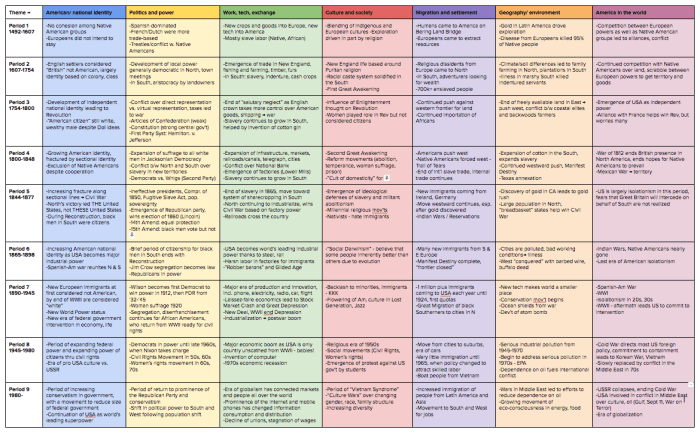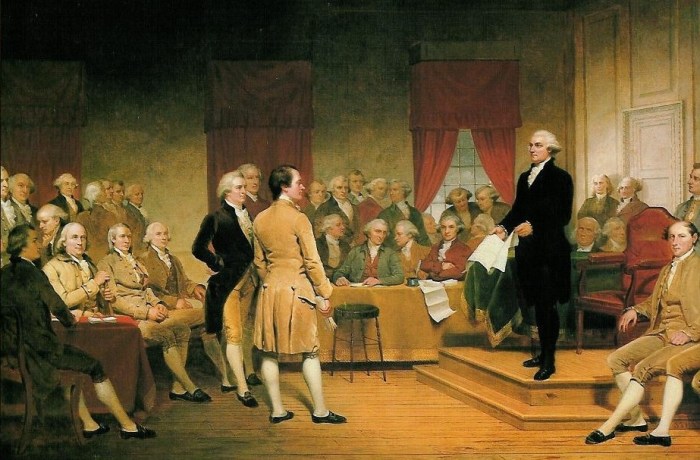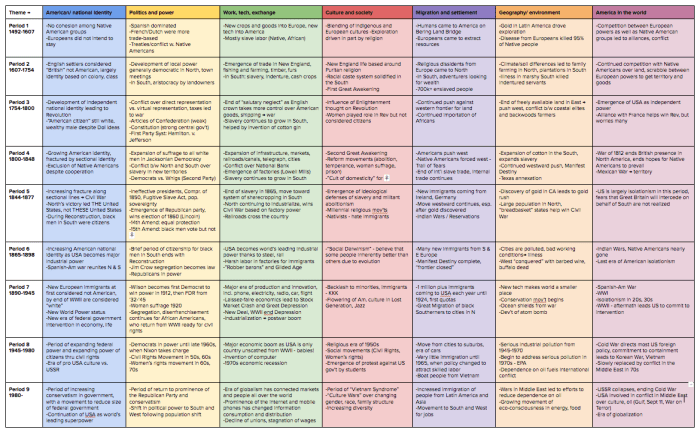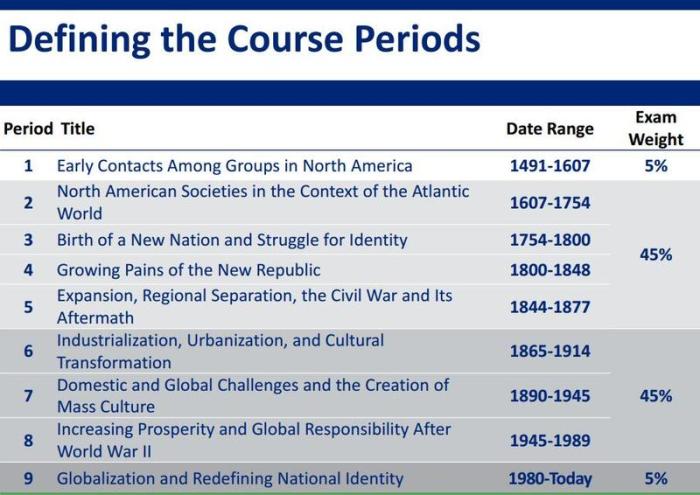Embark on an enlightening exploration of APUSH key terms by period, where we delve into the defining moments that shaped the American nation. Each period holds a treasure trove of pivotal events, and our journey will uncover the vocabulary that unlocks their significance, providing a deeper understanding of our shared past.
As we traverse the annals of American history, we’ll decipher the key terms that illuminate the motivations, challenges, and triumphs of the people who forged our nation. From the colonial era to the modern age, these terms serve as guideposts, helping us navigate the complexities of the American experience.
Periods in APUSH

The College Board’s Advanced Placement United States History course (APUSH) is divided into nine periods, each covering a specific time frame and major events in American history.
The periods are as follows:
Period 1: 1491-1607
- European exploration and colonization of the Americas
- Establishment of the first permanent English settlements in North America
Period 2: 1607-1754, Apush key terms by period
- Growth and development of the American colonies
- Conflicts between European powers and Native American tribes
Period 3: 1754-1789
- The French and Indian War
- The American Revolution
- The establishment of the United States of America
Period 4: 1789-1848
- The early republic and the formation of the federal government
- The War of 1812
- Westward expansion and the growth of the United States
Period 5: 1848-1877
- The Mexican-American War
- The Civil War
- Reconstruction
Period 6: 1877-1914
- The Industrial Revolution
- The rise of big business
- The growth of cities
Period 7: 1914-1945
- World War I
- The Great Depression
- World War II
Period 8: 1945-1980
- The Cold War
- The Civil Rights Movement
- The Vietnam War
Period 9: 1980-Present
- The Reagan Revolution
- The end of the Cold War
- The War on Terror
Key Terms for Each Period

To effectively study APUSH, it’s crucial to understand the key terms associated with each period. These terms form the foundation of the historical narrative and provide a framework for comprehending the events, ideas, and figures that shaped American history.
Period 1: Colonial America (1492-1763)
- Columbian Exchange:The exchange of plants, animals, diseases, and ideas between the Americas and Europe after Christopher Columbus’s arrival.
- Mercantilism:An economic system where colonies were established to provide raw materials and markets for the mother country.
- Salutary Neglect:Britain’s policy of loosely enforcing regulations on its American colonies, allowing them significant autonomy.
- Great Awakening:A religious revival movement that swept through the colonies in the 1730s and 1740s, emphasizing emotionalism and personal conversion.
- Enlightenment:An intellectual movement that stressed reason, individualism, and the belief in human progress.
Table of Key Terms: Apush Key Terms By Period

To facilitate efficient review and understanding of APUSH, we present a comprehensive table of key terms organized by period.
Table Structure
The table comprises four responsive columns. The first column lists the historical periods, while the remaining columns present the corresponding key terms for each period.
For those struggling with APUSH key terms by period, consider checking out this comprehensive guide: how to pass cci rcs exam . This resource offers valuable tips and strategies for mastering the essential concepts for each period in American history, ultimately enhancing your understanding of APUSH key terms by period.
| Period | Key Terms | Key Terms | Key Terms |
|---|---|---|---|
| Period 1 | Columbian Exchange | Enlightenment | French and Indian War |
| Period 2 | Declaration of Independence | Articles of Confederation | Constitution |
| Period 3 | Louisiana Purchase | War of 1812 | Monroe Doctrine |
| Period 4 | Jacksonian Democracy | Manifest Destiny | Mexican-American War |
| Period 5 | Civil War | Reconstruction | Industrial Revolution |
| Period 6 | Gilded Age | Progressive Era | World War I |
| Period 7 | Roaring Twenties | Great Depression | New Deal |
| Period 8 | World War II | Cold War | Civil Rights Movement |
| Period 9 | Vietnam War | Watergate Scandal | Reagan Revolution |
Discussion Questions

In order to foster a deeper understanding of the key terms in each period of APUSH, it is crucial to engage in critical analysis and comparative examinations.
By comparing and contrasting key terms across different periods, students can discern patterns, continuities, and changes in the historical landscape. Additionally, exploring the relationships between key terms and major events provides insights into the driving forces and consequences that have shaped American history.
- Analyze the similarities and differences between the key terms of the Colonial Era and the Early National Period. How do these terms reflect the evolving political, social, and economic landscape of the United States?
- Compare the key terms of the Antebellum Period and the Civil War Era. How do these terms illustrate the growing tensions between the North and the South, leading to the outbreak of the Civil War?
- Examine the key terms of the Reconstruction Era and the Gilded Age. How do these terms reveal the challenges and opportunities faced by the nation during these transformative periods?
- Explain how the key terms of the Progressive Era and the Great Depression relate to the social, economic, and political changes that occurred during these eras.
- Discuss the significance of the key terms of World War II and the Cold War in shaping American foreign policy and domestic life.
Clarifying Questions
What are the key terms for the Colonial Era?
Some key terms for the Colonial Era include: mercantilism, triangular trade, Enlightenment, Great Awakening, and Stamp Act.
How do key terms help us understand the Civil War?
Key terms such as secession, abolition, and emancipation provide insights into the causes, events, and consequences of the Civil War.
What is the significance of key terms in the Progressive Era?
Terms like muckrakers, trusts, and social welfare reflect the concerns and reforms of the Progressive Era, which sought to address social and economic problems.